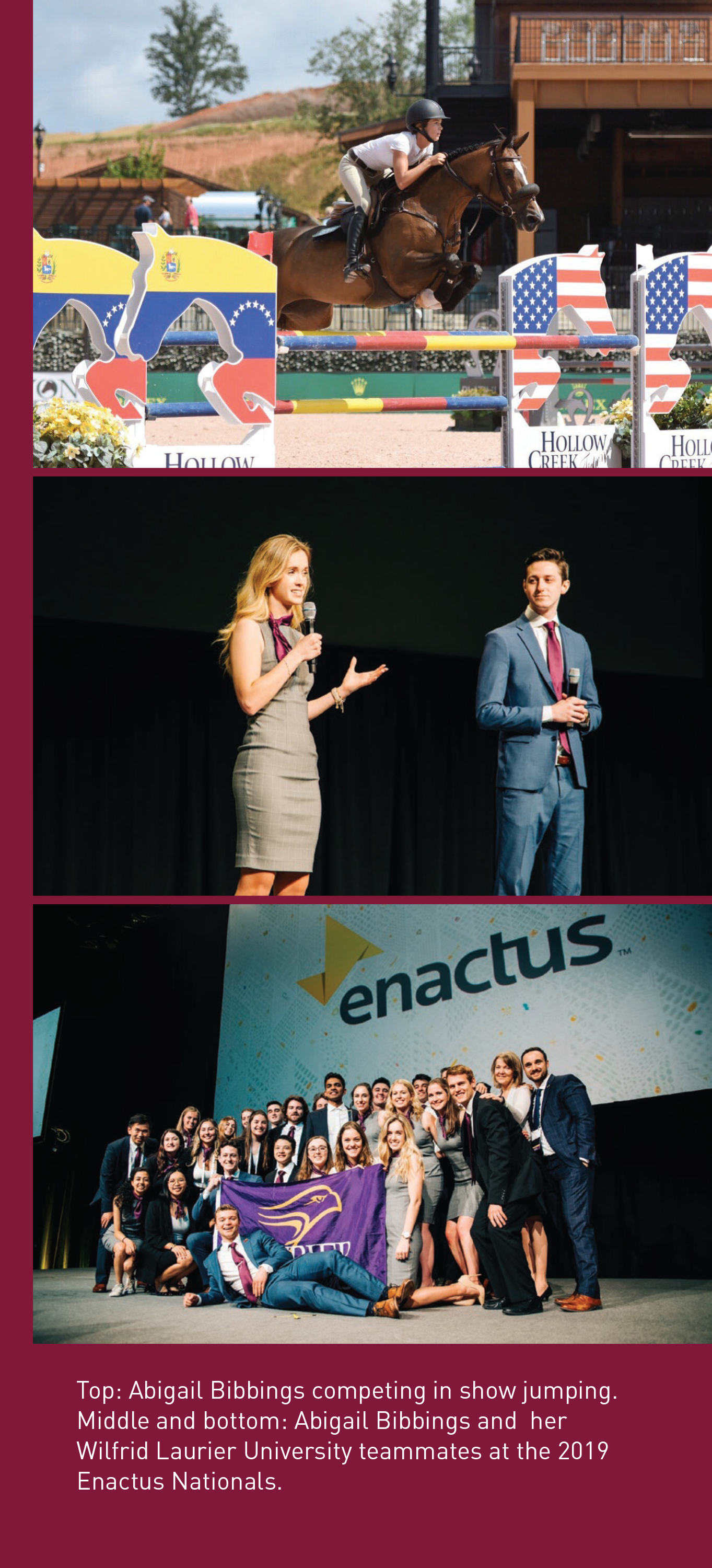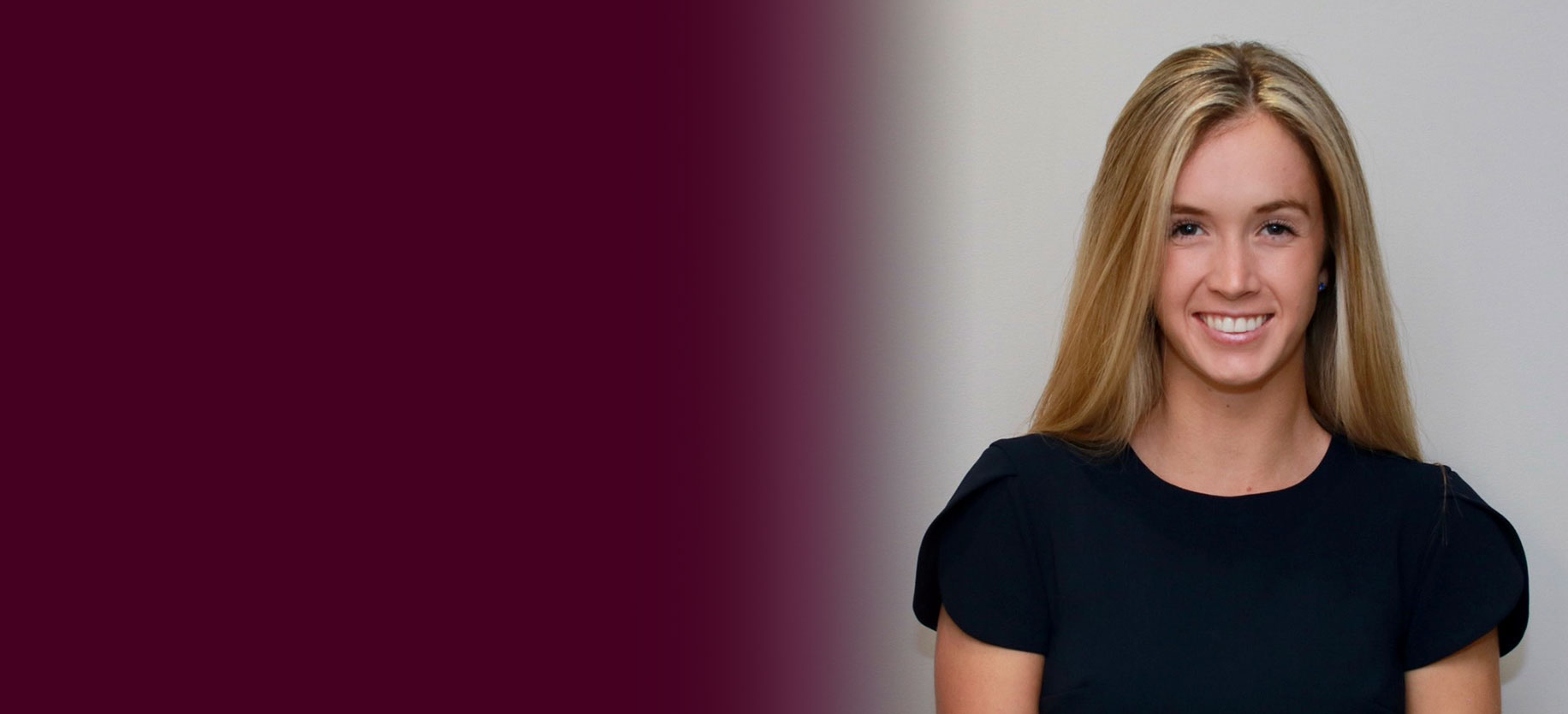Abigail Bibbings joined Burgundy Asset Management in 2020 as an investment analyst with a focus on U.S. large cap equities. Abigail earned a bachelor of business administration degree from Wilfrid Laurier University, and was a member of Burgundy’s internship program. In a conversation with Robyn Ross, Burgundy’s recruitment and development manager for the investment team, Abigail shares her entrepreneurial journey to investing.
Robyn Ross (RR): What were you passionate about when you were growing up?
Abigail Bibbings (AB): My childhood revolved around sports. I competed in volleyball, track and field and horseback riding. There was a point where I was on three volleyball teams, I was riding before school, at lunch and after school, and I was training with my high school track team as well as a separate city track club!
Sports amplified my competitive nature. I wanted to win individually, but I also enjoyed working with a team. As I grew older, however, I leaned more towards individual sports. I like to be able to take ownership of a result, learn from what went right and wrong and make improvements.
RR: How did you manage your grades with so much time dedicated to sports?
AB: If I am being honest, I did not study very much in high school. I was not the kid with a 90-percent-plus average. My dad jokes that I passed my courses by correctly predicting which questions would be on the tests. However, there was one exception: business. I found studying business courses to be so interesting, and I had an amazing teacher. It also helped that both my parents are very entrepreneurial and have founded and owned businesses themselves.
RR: Tell us more about your entrepreneurial family.
AB: My mom had owned a furniture store in Ottawa, and when I was in grade nine she opened a dress store in London, Ontario. The idea for the dress store came to us after we went shopping for a Grade 8 graduation dress. The experience prompted us to discuss the lack of competition in the London market and then brainstorm ideas on how the shopping experience could be better. The next thing I knew, there were dresses in my living room and my mom was starting the store.
My dad is also very entrepreneurial and has a way of looking for opportunities in all situations. He is a big ideas guy; he has a new “next big thing” thought almost every week. It makes for really fun and interesting conversations!
My family members are my role models. They truly believe in giving everyone the freedom to invent themselves. My parents’ only rule was to work hard at everything we did so that we could keep our options open.
RR: What do you consider the most defining experience in your life so far?
AB: It was living in Florida for a year and a half after finishing high school early. I moved there so that I could work with horses and compete at the Winter Equestrian Festival in Wellington, Fla. I was 17 when I went and did not know anyone, including the people I was planning to work for. However, I learned the value of going the extra mile quickly. In the end, I not only had the best time of my life, but I also gained a second family while accomplishing a lot of the personal goals I had in the sport.
RR: What other life lessons did you learn from your equestrian experience?
AB: I was originally only supposed to stay in the United States for six months but I had this gut feeling that deferring university and staying south for another year was the right thing to do—and it turned out to be the best decision I ever made. It gave me the confidence to trust my own judgement and cancel out the noise around me. I really believe in taking the time to think about what you actually want in life, gathering all the facts so you can make an informed decision, and then trusting your gut to make the final decision. This process helped me decide where to do internships, and, ultimately, to accept a full-time analyst position at Burgundy.
RR: How did your university experience change you?
AB: Going into it, I saw university as an obligation—but that changed quickly, and school became an opportunity to learn new, interesting things every day. I loved every course I took, and I met unbelievably cool people. One of those people was my roommate Yulhee – meeting her and throwing myself into school with her changed my life. We became best friends and we pushed each other to do and be better every day. The other person who really changed me was my first-year business professor Laura Allan. She jokes with me now that I never stopped asking her questions. She inspired me to join Enactus.
RR: Tell us about Enactus. How has it shaped who you are today?
AB: Enactus is an international organization that runs social ventures in 37 countries around the world. It is comprised of 100-percent student-run businesses that work to address different social, environmental and economic issues our world is facing. There is also a competitive aspect to it, which I naturally love—you compete on the size, sustainability, and scalability of the impact you have made over the course of the year. Every school puts together presentations on their impact and competes at a regional and national level every year. The last level is the World Cup, at which only the top team from each country competes.

When I first started with Enactus, our team was small and our businesses were mediocre. We were doing great things, but nothing was scalable. I sat down with Professor Allan in my second year and we decided that before I graduated, we would make it to the Enactus World Cup. It seemed a far-fetched idea at the time, but in September 2020 I was proud to be on the team representing Canada. Of the 32 teams in the World Cup competition, we were named the runner-up.
The Enactus experience changed my life goals. Nothing gives me the same level of satisfaction as making positive changes in the world, even if it is on a small scale. I used to think that only charities could make changes like that, but Enactus exposed me to this whole new world in which people are empowered to make change themselves. Seeing how business can be used as a force for good has reshaped what I want to do in my life. We face a lot of big, pressing challenges today and it is going to take buy-in from all parties to make any real change. But I really believe that with these changes will come positive impact for people and the planet, and also for businesses as well.
“Seeing how business can be used as a force for good has reshaped what I want to do in my life.”
RR: What did you think a Financial Analyst job entailed when you were in school?
AB: I honestly thought financial analysts just analyzed numbers all day. I did not know anyone that worked in a job like the one I have now, and I only learned what it really entailed when I was in my third year of university. Working with Enactus and learning how to run a business and analyze other businesses taught me the skills that I use most in this job. The technical side is learnable, and numbers have kind of always just made sense to me. The part I really love is understanding the qualitative side and then marrying that to the numbers to create a clear picture of the companies that I am analyzing. The nature of the work just fits so well with my love of questioning things and really understanding things from the ground up. I also love the continuous challenge.
RR: What advice would you have for the young high school and university students out there who are potentially interested in a career in finance?
AB: You don’t need to have grown up knowing that you wanted to work in finance. You also don’t need to have parents in the industry and you definitely don’t need to know all the jargon on day one. Take time to figure out what it is you love doing and then make a plan to do it. It’s about figuring out the right path for you, in terms of both the end destination and how you get there. Have faith in yourself and trust your gut, you will encounter both successes and failures on the way but that is what makes the whole journey that much more fun.
This post is presented for illustrative and discussion purposes only. It is not intended to provide investment advice and does not consider unique objectives, constraints or financial needs. Under no circumstances does this post suggest that you should time the market in any way or make investment decisions based on the content. Select securities may be used as examples to illustrate Burgundy’s investment philosophy. Burgundy funds or portfolios may or may not hold such securities for the whole demonstrated period. Investors are advised that their investments are not guaranteed, their values change frequently and past performance may not be repeated. This post is not intended as an offer to invest in any investment strategy presented by Burgundy. The information contained in this post is the opinion of Burgundy Asset Management and/or its employees as of the date of the post and is subject to change without notice. Please refer to the Legal section of this website for additional information.

